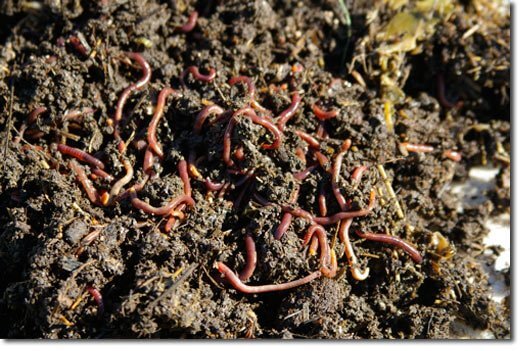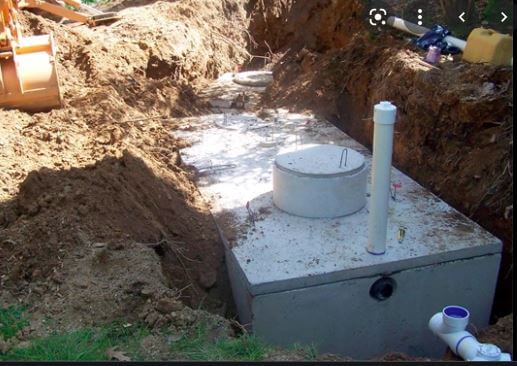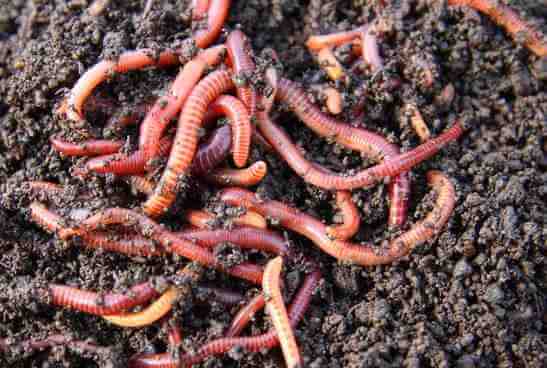As you may (or may not) know, the waste that is sent to the septic tank is broken down by anaerobic bacteria.
These bacteria “eat” the solid waste and release a liquid waste that has been partially treated and is ready for the drain field for the final process of treatment.
But bacteria are not the only organisms that can be useful in the treatment of waste in the septic tank—other creatures like protozoa might also help.
But what about worms?
Can they also help in wastewater treatment in onsite waste management systems?
More specifically…
Do Worms For Septic Tanks Work?
Yes! Worms can actually help in the wastewater treatment process.
Studies have found that worms are very good at breaking down waste and that might explain why they are often found near trenches in septic system drain fields.
However, just like is the case of bacteria, not all types of worms are ideal for breaking down septic tank waste.
Scientists have reasons to believe that deep-burrowers are not very good.
The worms that burrow near the soil surface help the septic waste to spread better and evenly throughout the soil which gives the soil a better chance of treating the water before it percolates to the groundwater.
Night crawlers are not ideal because they burrow through the soil too quickly which means the septic waste will percolate too quickly and thereby reach groundwater before it is sufficiently treated.
The best type of work for septic systems is the tiger worm. Tiger worms are also known as Eisenia hortensis, or red wigglers.
These worms are close relatives of the common worms but they are more aggressive which is why they are commonly used in vermicomposting (a process of using worms to turn waste into humus).
Their effectiveness in vermicomposting is the same reason why they are a great pick for septic systems.
Tiger worms can be used to maintain a healthy septic system by breaking down solids and promoting the growth of beneficial bacteria.
They also reproduce very quickly, so you only need to introduce a few and you will have a healthy population without needing to replenish them anytime soon.
Worms vs. Bacteria

One of the advantages worms have over bacteria is their tolerance for harsh chemicals.
Any modern household sends all manner of chemicals down the drain due to the cleaning products we use.
For instance, most soaps are made of surfactants and other chemicals that eventually reach the septic tank.
Unfortunately, these chemicals may be too harsh for bacteria and so they may affect the bacteria population in the septic tank.
This is where worms trump bacteria—they have a unique physiology that helps them to tolerate most household chemicals.
In fact, worms can ingest them and convert them into biodegradable waste through their gut.
It is worth noting that worms shouldn’t be thought of as a replacement for bacteria in the septic tank.
Worms need air to breathe and they may not necessarily survive in a septic tank, which is after all septic.
The bacteria that break down waste in the septic tank are called anaerobic bacteria because they can thrive in the absence of oxygen.
However, worms are an important addition to the septic system because they can thrive in the drain field where they will assist in the final stages of wastewater treatment.
Will Worms Interfere With Helpful Bacteria In Your Septic Tank?
Worms are good for your septic system because they help break down the waste.
They will not pose any threat to the helpful bacteria because they only feed on the waste.
Because worms are resistant to chemicals that would otherwise kill bacteria, they can actually help improve the bacteria population in the septic system.
Worms can ingest the compounds that bacteria wouldn’t break down, thereby making the environment more conducive for growth of helpful bacteria.
However, not all worms are good for your septic system and some will even do more harm than good.
The septic conditions in the tank make it hard for most worms to thrive and you will need special kinds of worms that do not need much oxygen.
This is why you should only buy worms (and any other septic tank product) that have been independently tested and certified.
Should You Get Worms Out Of Your Septic System?
Well, that depends on the kind of worms you have because as science has proved, worms can either make your septic system better or worse depending on the type of worms you have.
As a rule of thumb, worms that are deep-burrowers (like night crawlers) are bad for the septic system and it might be a good idea to get rid of them.
However, if you have shallow burrowers, you do not need to worry about them because they are actually helping to make your septic system more efficient.
It is very unlikely that you will naturally attract the wrong type of worms in your drain field area so you have no reason to worry.
But you may still consult a septic tank expert just to be sure the worms you have are the ones you want.
Beware: Worms Alone Will Not Guarantee an Efficient Septic System

Yes, worms can help your septic system but they are not the silver bullet for an efficient septic system.
As a septic system owner, you still need to take other measures to ensure your system does not fail.
Here are a couple of things that you may want to do to make sure the system runs efficiently all year long.
I. Watch the Products You Use
Some of the cleaning products you use may be causing a lot of damage to the septic system.
It is a good idea to use septic-safe cleaning products.
This is because the harsh chemicals in the other products could easily kill bacteria in the septic tank.
Also, avoid flushing pharmaceutical products because they contain substances that might kill the bacteria.
Related:
Is Dove Bar Soap Safe For Septic Systems?
Is Pine Sol Safe For Septic Tanks?
Is Method Hand Soap Septic Safe?
II. Regular Maintenance
Regular maintenance entails adding septic tank additives to the system.
These additives help to boost the enzyme and Bactria population in the system which gives the system a lease of new life.
You should also pump your septic tank every 2-5 years deepening on the size of your system
III. Take Other Precautions
For instance, avoid walking or driving over the drain field area because you do not want to compact the soil above it.
Also, any waste that is not biodegradable should not be sent down the drain because it will just build up in the system which could cause a system failure.
Final Thoughts
If you are not into fishing or gardening, you may not think much of earthworms.
But you may want to think twice about these creatures because they actually do you a lot of good.
As long as you have the right kind, worms will help your septic system to function better.
And do not worry about them slithering into your house because they will spend all day burrowing away in the soil – unless, you go digging for them which is the last thing you want to do on your drain field anyway.
